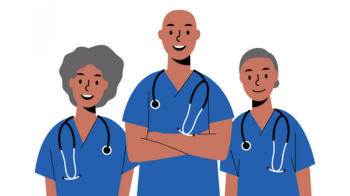What is Bell’s palsy?
Bell’s palsy is a medical problem causing weakness of the muscles on one side of the face. It is usually temporary - with most people making a full recovery within two to three months. It comes on suddenly and the cause is unknown.
The facial nerve supplies the muscles in your face. In Bell’s palsy this nerve is affected, leading to weakness or paralysis of the muscles that control smiling, frowning, eating and closing the eyelids. It can also affect your ability to taste.
Bell’s palsy can affect men and women of any age but is most common in 15-45 year olds. In the UK it affects approximately one in 70 people at some point in their lifetime.
What are the symptoms of Bell’s palsy?
The symptoms of Bell’s palsy often occur very quickly, over a few hours or overnight. The weakness or paralysis usually affects one side of your face.
The symptoms will vary and may include:
- Facial pain around your ear on the affected side.
- Drooping of the face on one side.
- When you smile, only one side of the face may move, you may not be able to frown, and speaking clearly may be difficult.
- Difficulty closing your eye. It may not fully close and may water or become dry.
- Difficulty when chewing food, you may dribble slightly.
- Altered or loss of taste on one side of your tongue.
- Sensitivity to noise. Noises may sound louder than usual which can be uncomfortable.
Treatment
Medications
You may have been prescribed oral steroids (prednisolone) if your symptoms started in the last 3 days. If you have been prescribed steroids take 50mg (10 tablets) once a day for 10 days along with omeprazole 20mg once a day for 14 days then stop. Steroids may help to reduce inflammation and decrease the likelihood of damage to the facial nerve.
Mouth care
As the facial muscle may not be functioning fully, food may become stuck around the teeth and gums on the affected side. Make sure you remember to clean this area well and remove all debris after eating.
Eye care
Eye care is very important if your eye is affected. If your eye does not close when blinking:
- The eye can dry up. You should use eye drops or artificial tears to keep the eye moist. Use artificial tear drops during the day and a thicker solution at night. Ask your pharmacist for advice.
- The eye will not have the normal protection from the eye lid closing. It is important to protect the eye and avoid scratching the cornea (the thin, transparent layer covering the eye). Do not use contact lenses until your eye returns to normal. You may be advised to wear an eye patch by day and to tape the affected eye lid closed at night if your eye does not close when you sleep. Tape such as transpore can be used for this.
Advice for taping of the eye shut at night
- Cut the tape slightly longer than the width of your eye.
- If using night time ointments these should be inserted into the eye.
- Look down.
- Assist the eye closure with the back of your finger.
- Apply tape from the inner corner to outer corner of the eye in a horizontal direction so that it extends beyond the width of the eyebrow.
- Ensure that the eyelid is fully closed; the tape is on the upper lid and covers the area underneath the eye.
Video: How to Tape Your Eye Closed (Adults) - Facial Palsy UK
Exercises can be useful to tone the facial muscles as the movement begins to return, perform 10 each of these exercises 4 times a day:
- Gently raise your eyebrows – you can help the movement with your fingers.
- Wrinkle your nose.
- Try and flare your nostrils.
- Lift one corner of the mouth and then the other.
- Smile without showing your teeth, then smile with showing your teeth.
- Bring your eyebrows together in a frown.
Prognosis
75-90 people in every 100 people who have Bell’s palsy start to improve within three weeks, and make a full recovery within two to three months. However, about 5-10 people in every 100 people who have Bell’s palsy have some slight weakness which remains forever. Rarely there may be little or no improvement.
Do I need follow up?
Most people with Bell’s palsy make a full recovery in 3 weeks to 3 months. If you do not make a full recovery in 3 weeks then make an appointment with your GP.
If you are unable to close your eye normally and develop pain, stinging or visual disturbance please attend the Eye Casualty at the Bristol Eye Hospital in the next 24 hours. The Bristol Eye Hospital Casualty is open 7 days a week from 8.30am - 4.30pm. Further information can be found at Bristol Eye Hospital - How to find us
© North Bristol NHS Trust. This edition published June 2025. Review due June 2028. NBT003415.
Support your local hospital charity

See the impact we make across our hospitals and how you can be a part of it.

